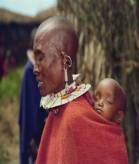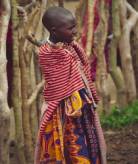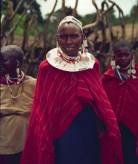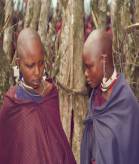|
----------------------------------------------------------------------------------------
 The
Maasai have always been special. Their bright
red robes set them apart visually. Spear in
hand, they are calm and courageous regardless of
the danger. The armed British troops who drove
the Maasai from their lands in the late 19th
century had great respect for these fearless
tribesmen. Up until recently, the only way for a
Maasai boy to achieve warrior status was to
single-handedly kill a lion with his spear.
When you see a Maasai for the first time, you
will likely agree with what Karen Blixen (Isak
Dinesen) wrote about her experience in East
Africa in her book Out of Africa: The
Maasai have always been special. Their bright
red robes set them apart visually. Spear in
hand, they are calm and courageous regardless of
the danger. The armed British troops who drove
the Maasai from their lands in the late 19th
century had great respect for these fearless
tribesmen. Up until recently, the only way for a
Maasai boy to achieve warrior status was to
single-handedly kill a lion with his spear.
When you see a Maasai for the first time, you
will likely agree with what Karen Blixen (Isak
Dinesen) wrote about her experience in East
Africa in her book Out of Africa:
"A
Maasai warrior is a fine sight. Those young men
have, to the utmost extent, that particular form
of intelligence which we call chic; daring and
wildly fantastical as they seem, they are still
unswervingly true to their own nature, and to an
immanent ideal. Their style is not an assumed
manner, nor an imitation of a foreign
perfection; it has grown from the inside, and is
an expression of the race and its history, and
their weapons and finery are as much a part of
their being as are a stag's antlers."
Kenya
recognizes over fifty tribes of native people.
The Maasai are one of these tribes, making up
about 1.5 % of the country's population.
The Maasai have always been special. Their
bright red robes set them apart visually. Spear
in hand, they are
calm
and courageous regardless of the danger. The
armed British troops who drove the Maasai from
their lands in the late 19th century had great
respect for these fearless tribesmen. Up until
recently, the only way for a Maasai boy to
achieve warrior status was to single-handedly
kill a lion with his spear.
of the country's population.
The Maasai have always been special. Their
bright red robes set them apart visually. Spear
in hand, they are
calm
and courageous regardless of the danger. The
armed British troops who drove the Maasai from
their lands in the late 19th century had great
respect for these fearless tribesmen. Up until
recently, the only way for a Maasai boy to
achieve warrior status was to single-handedly
kill a lion with his spear.
The
Maasai have not fared well in modern Africa.
Until the British settlers arrived, fierce
Maasai tribes occupied the most fertile lands.
The Maasai struggled to preserve their
territory, but their spears were no match for
armed British troops, and their lawyers never
had a fair chance in British courtrooms. The
Maasai lost about two-thirds of their lands and
were relocated to less fertile parts of Kenya
and Tanzania. Other tribes of Kenya have adapted
more readily to the "progress" of
modern times. In contrast, the Maasai have
persisted in their traditional ways, so as Kenya
takes more land for national parks and
agriculture, they suffer.
 One
positive trend for the Maasai in recent years
has been the development of a specific form of
eco-tourism. Although other tribes in Kenya
regard wildlife as food or a menace to their
crops, the Maasai co-exist with wildlife.
Occasionally, a lion will take a cow or some
goats and have to be caught and released in a
national park, but this is rare. Normally, the
Maasai and the wildlife simply live together
peacefully.
This peaceful co-existence creates the potential
for a form of low-impact tourism, like Campi ya
Kanzi. The Kuku Group Ranch where the camp is
located has 400 square miles of land, and is
occupied by only 3000 Maasai. The ranch is rich
in wildlife since it adjoins Tsavo West National
Park, Chyulu National Park and Amboseli National
Park. Animals are fully protected in these
national parks, and they use the ranch as a
corridor connecting the Parks. One
positive trend for the Maasai in recent years
has been the development of a specific form of
eco-tourism. Although other tribes in Kenya
regard wildlife as food or a menace to their
crops, the Maasai co-exist with wildlife.
Occasionally, a lion will take a cow or some
goats and have to be caught and released in a
national park, but this is rare. Normally, the
Maasai and the wildlife simply live together
peacefully.
This peaceful co-existence creates the potential
for a form of low-impact tourism, like Campi ya
Kanzi. The Kuku Group Ranch where the camp is
located has 400 square miles of land, and is
occupied by only 3000 Maasai. The ranch is rich
in wildlife since it adjoins Tsavo West National
Park, Chyulu National Park and Amboseli National
Park. Animals are fully protected in these
national parks, and they use the ranch as a
corridor connecting the Parks.
 Part
of the fees visitors pay to Campi ya Kanzi are
returned to the Maasai owners of Kuku Group
Ranch. Thus, by sharing their vast lands with a
maximum of 12 visitors from Campi ya Kanzi, the
Maasai of Kuku Group Ranch benefit in several
ways: Part
of the fees visitors pay to Campi ya Kanzi are
returned to the Maasai owners of Kuku Group
Ranch. Thus, by sharing their vast lands with a
maximum of 12 visitors from Campi ya Kanzi, the
Maasai of Kuku Group Ranch benefit in several
ways:
*
They maintain their lands in a natural state.
*
They generate income to improve their nutrition
and their children's education.
*
They preserve their traditional ways and
dignity.
Your
visit to the camp helps the Maasai retain their
heritage.
----------------------------------------------------------------------------------------
|
